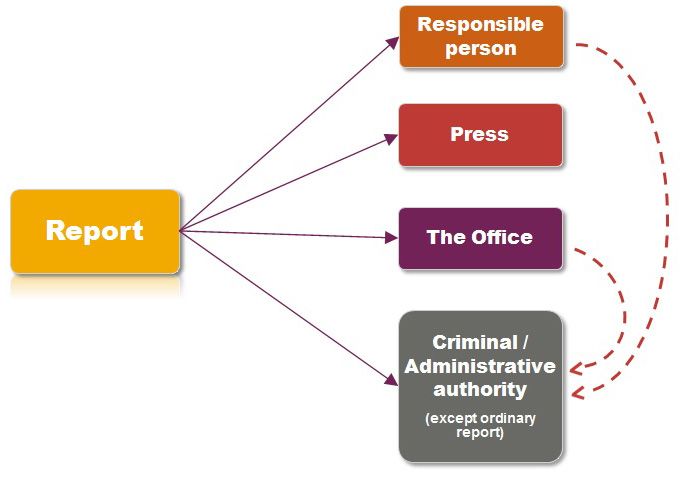The new Slovak Act on Whistleblowing that took effect 1 March 2019 has introduced some notable changes to the obligations that employers faced under the previous Act on Whistleblowing valid until 28 February 2019.
Below we provide a short overview of the relevant obligations of employers in Slovakia applicable under the new Act on Whistleblowing. This may be useful, as in the coming months the new Office for the Protection of Whistleblowers (the "Office", website only in the Slovak language) is likely to keep an eye on employer compliance with this Act.
To whom does the Act on Whistleblowing apply?
Obliged persons remain unchanged under the new Act on Whistleblowing, i.e., any employer in Slovakia with 50 or more employees must appoint either a branch/unit or a responsible person to handle reports submitted by employees about potentially unlawful activity taking place at the employer. The new Act on Whistleblowing creates an option for employees to report externally by providing protection to whistleblowers who provide information to the media if they believe in good faith that the employer would not deal with their report or would retaliate against them.
What are the obligations?
1 Internal reporting
Each employer in Slovakia with 50 or more employees must create conditions and procedures for internal reporting to allow employees to report potentially unlawful activities at the employer. One of these procedures must be available to employees on a 24/7 basis, e.g., a hotline or an e-mail address will suffice.
The obliged employer must develop a policy on reporting potentially unlawful activities that addresses the following issues:
- which channel is chosen for receiving reports;
- which person or branch office / unit is responsible for investigating and following up on reports;
- how the whistleblower's identity will be kept in confidence;
- how records will be kept about whistleblower reports, whistleblower identities, what the report concerns, the result of the investigation and date when the investigation was finalised;
- how the whistleblower will be informed about the result of the investigation; and
- how personal information included in the whistleblower's report will be processed.
2 Responsible person
The absence of any requirement for specific training for the responsible person caused general dissatisfaction under the previous Act on Whistleblowing. Under the new Act, as of 1 March 2019 employers can only appoint a responsible person who meets "professional requirements". As the Act on Whistleblowing does not further define this, it is assumed that "professional requirements" means competence based on both the education and experience of the responsible person. The Office will provide specific training to responsible persons in order to ensure due fulfilment of their obligations.
The emphasis placed in the Act on Whistleblowing on the discharge of the responsible person's office is meant to assist employers in the fulfilment of their obligations under the Act on Whistleblowing. Thus the new Act defines the responsible person as a qualified individual who handles whistleblowing reports for the employer, i.e. gives information about whistleblowing report submission procedures to any interested employee, receives and investigates such reports, and maintains contact with the whistleblowing employee to inform them of the progress and result of the investigation.
The employer must provide to the responsible person its full co-operation, sufficient resources, and access to employees' personal data and any additional documentation. If the responsible person is employed by the employer, the employer must prevent any potential conflict of interest that may arise from the performance of duties that the responsible person has as an employee. If not employed by the employer, the responsible person is bound only by instructions issued by the employer's executive body.
3 Technical and organisational readiness
The employer must keep the submission of reports 'user friendly' and adopt applicable technical and organisational measures to ensure that its internal system for the submission of employee reports complies at all times with the Act on Whistleblowing.
Protection of whistleblowers
As in the previous Act on Whistleblowing, an employee may still submit either:
- an 'ordinary' report in the case of a misconduct or wrongdoing the employee knows about in connection with the performance of their work and that does not meet the elements of a criminal offence, or
- a 'qualified' report, which contributes to the determination of a serious breach of law that qualifies as a criminal offence, or to the charging and/or conviction of its perpetrator.
If there is a responsible person at the employer, employees have the following options for the submission of their reports:
- to the responsible person, who will deal with the report internally or forward it to the respective authority if it is a qualified report;
- to the Office, however only in cases of a qualified report, in which case the Office will forward the report to the relevant criminal or administrative authority authorised to deal with it (in practice, it remains to be seen whether and how, or if at all, the Office will handle ordinary reports submitted to it);
- if it is a qualified report. to the relevant criminal or administrative authority authorised to deal with it;
- to the media, if submitted in good faith that the employer would not deal with the report or would retaliate against the whistleblower.
Alternatives to whom an employee may report:

If reporting employees work for an employer who is NOT obliged to appoint a responsible person, they may submit their report to:
- the Office, if they submit a qualified report, in which case the Office will forward it to the relevant criminal or administrative authority authorised to deal with it;
- the relevant criminal or administrative authority authorised to deal with it, if it is a qualified report (the options under (i) and (ii) applied also under the previous Act on Whistleblowing); or
- the media, on the condition that they submit the report in good faith that the employer would not deal with it or would retaliate against the whistleblower.
The protection provided to the whistleblower by the Office differs, depending on the type of submitted report. In the case of:
1. an ordinary report—the reporting person should ask for protection through the Office within 15 days from the date on which the reporting person acknowledges that an adverse action (such as dismissal or salary decrease) has been taken against them by the employer. The Office then requests a statement from the employer, and the employer must prove that there is no link between the whistleblower's report and the adverse action taken against them. If the employer is not able to prove the absence of such a link, the Office suspends the effectiveness of the employer's action and as such grants protection to the employee. Within 30 days after the Office issues its decision, the whistleblowing employee must file a request for an interim measure at the court with jurisdiction if he wishes to remain protected against further retaliation from the employer. Such protection stays in place for the time period defined in the interim measure issued by the respective court;
2. a qualified report—the reporting person should ask for protection at the respective criminal or administrative authority to whom he/she submits the report. The criminal or administrative authority then notifies the Office, the employer and the employee, and protection is granted automatically upon request. Protection based on the submission of a qualified report means that the employer cannot make any adverse actions against the employee without the prior approval of the Office. Such protection is in place for the whole term of criminal or administrative proceedings, and for three years after the termination of such proceedings.
Office for the Protection of Whistleblowers
One of the most important roles of this Office is to provide protection for whistleblowers, i.e. a reporting employee, against retaliation by the employer after the whistleblowing report has been made (as described above). The Office is also entitled to examine the process and result of an investigation into a submitted report and how it was handled. Further, the Office provides guidance for the development of internal reporting procedures by employers, consultancy for employees, specific trainings for responsible persons, and also imposes sanctions on employers for non-compliance with the provisions of the Act on Whistleblowing.
The Office will launch its operations no later than six months following the election of its Chairman. The election process is currently on-going and has attracted much attention and scrutiny of the candidates. In the meantime, the obligations of the Office are handled by the Labour Inspectorate. Whether the Office makes a difference once it properly assumes its role remains unclear at present, as much depends on how the future Chairman and staff approach their roles in the Office.
Sanctions
Employers must bring their internal systems for the submission of employee reports into compliance with the new Act on Whistleblowing by no later than 30 September 2019. Employers that fail to fulfil this obligation can be penalised with a fine of up to EUR 20,000 imposed by the Office.
The content of this article is intended to provide a general guide to the subject matter. Specialist advice should be sought about your specific circumstances.

